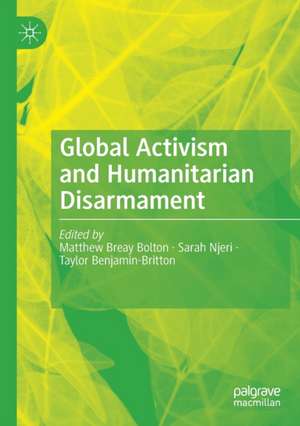Global Activism and Humanitarian Disarmament
Editat de Matthew Breay Bolton, Sarah Njeri, Taylor Benjamin-Brittonen Limba Engleză Paperback – 12 noi 2020
| Toate formatele și edițiile | Preț | Express |
|---|---|---|
| Paperback (1) | 778.76 lei 6-8 săpt. | |
| Springer International Publishing – 12 noi 2020 | 778.76 lei 6-8 săpt. | |
| Hardback (1) | 788.22 lei 6-8 săpt. | |
| Springer International Publishing – 12 noi 2019 | 788.22 lei 6-8 săpt. |
Preț: 778.76 lei
Preț vechi: 949.71 lei
-18% Nou
Puncte Express: 1168
Preț estimativ în valută:
149.01€ • 162.37$ • 125.57£
149.01€ • 162.37$ • 125.57£
Carte tipărită la comandă
Livrare economică 23 aprilie-07 mai
Preluare comenzi: 021 569.72.76
Specificații
ISBN-13: 9783030276133
ISBN-10: 3030276139
Pagini: 272
Ilustrații: XVII, 272 p. 9 illus., 8 illus. in color.
Dimensiuni: 148 x 210 mm
Greutate: 0.35 kg
Ediția:1st ed. 2020
Editura: Springer International Publishing
Colecția Palgrave Macmillan
Locul publicării:Cham, Switzerland
ISBN-10: 3030276139
Pagini: 272
Ilustrații: XVII, 272 p. 9 illus., 8 illus. in color.
Dimensiuni: 148 x 210 mm
Greutate: 0.35 kg
Ediția:1st ed. 2020
Editura: Springer International Publishing
Colecția Palgrave Macmillan
Locul publicării:Cham, Switzerland
Cuprins
1. The Humanitarian Disarmament Movement: An Assessment and Review
by Taylor Benjamin-Britton, Matthew Bolton and Sarah Njeri
Part I: Emergence of Norms
2. When Scientists become Activists: The International Committee for Robot Arms Control and the Politics of Killer Robots
by Matthew Bolton and Cayman Mitchell
3. The Agency of International Humanitarian Disarmament Law: The Case of Advocacy for Positive Obligations in the Treaty on the Prohibition of Nuclear Weapons
by Matthew Bolton and Elizabeth Minor
4. Religious Advocacy and Activism for the Treaty on the Prohibition of Nuclear Weapons
by Emily Welty, with Gabrielle Chalk
Part II: Challenges in Diffusing and Implementing Norms
5. US Arms Control Dynamics in the Era of Humanitarian Disarmament: A Case Study of the Convention on Cluster Munitions
by Taylor Benjamin-Britton
6. The Politics of Non-Recognition: Re-evaluating the Apolitical Presentation of the UN Humanitarian Mine Action Programmes in Somaliland
by Sarah Njeri
Part III: The Wider Context
7. The Relationship between Humanitarian Disarmament and General and Complete Disarmament
by Dan Plesch and Kevin Miletic
8. Assessing the Political Impact of Inclusion and Exclusion in Multilateral Disarmament Forums
by Elizabeth Minor
Notă biografică
Matthew Breay Bolton is Associate Professor of Political Science and Director of the International Disarmament Institute at Pace University, USA.
Sarah Njeri is Research Associate at King’s College London’s African Leadership Centre, UK.
Taylor Benjamin-Britton has taught courses in international relations and international organization in the Department of Political Science at Temple University, as well as the Department of International Relations at Lehigh University, USA.
Textul de pe ultima copertă
This book analyses the politics of the humanitarian disarmament community—a loose coalition of activist and advocacy groups, humanitarian agencies and diplomats—who have successfully achieved international treaties banning landmines, cluster munitions and nuclear weapons, as well as restricting the global arms trade. Two campaigns have won Nobel Peace Prizes. Disarmament has long been a dirty word in the international relations lexicon. But the success of the humanitarian disarmament agenda shows that people often choose to prohibit or limit certain violent technologies, for reasons of security, honour, ethics or humanitarianism. This edited volume showcases interdisciplinary research by scholars and practitioners seeking to understand the dynamics and impact of the new global activism on weapons. While some raise concerns that humanitarian disarmament may be piecemeal and depoliticizing, others see opportunities to breathe new life into moribund arms control policymaking. Foreword by 1997 Nobel Peace Prize Laureate Jody Williams.
Matthew Breay Bolton is Associate Professor of Political Science and Director of the International Disarmament Institute at Pace University, USA.
Sarah Njeri is Research Associate at King’s College London’s African Leadership Centre, UK.
Caracteristici
Provides the first comprehensive academic examination of the humanitarian disarmament sector
Shows how advocacy organizations and small states can influence the international political agenda on security issues
Offers insight into how certain weapons become banned and stigmatized and others do not
Shows how advocacy organizations and small states can influence the international political agenda on security issues
Offers insight into how certain weapons become banned and stigmatized and others do not
